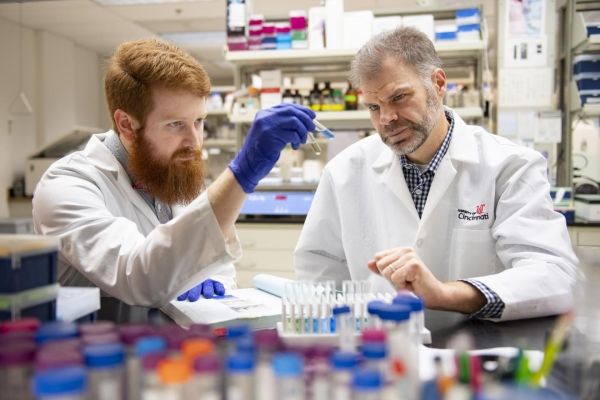Triglycerides, those fats that seem to be the bane of any diet, remain a mystery for many researchers. Plenty of them are in Big Macs, deep pan pizza and the like, but some are a necessity to fuel the body for daily activities.
Researchers Mark Castleberry, a doctoral student, and professor Sean Davidson, both in the UC College of Medicine, have found a way to produce in the laboratory a human protein produced in the liver known as Apolipoprotein A5 (APOA 5). It plays an important role in metabolizing and clearing excess levels of triglycerides from the bloodstream.
Their findings are available in the American Society for Biochemistry and Molecular Biology’s Journal of Lipid Research online. Castleberry, who is studying in the UC Department of Molecular Genetics, Biochemistry and Microbiology, is the paper’s first author. He is shown in the photo above with Davidson.
“We are really interested in understanding triglycerides because hypertriglyceridemia — too much fat in your blood — is a big factor leading to cardiovascular disease, diabetes, obesity and other health concerns,” explains Davidson, who holds appointments in UC’s departments of Pathology and Laboratory Medicine and Molecular Genetics, Biochemistry and Microbiology. “When you have a lot of fat that is hanging around in your circulation it’s important to clear as much of it out as soon as possible.”
Read more at University of Cincinnati
Image: Mark Castleberry and Sean Davidson, PhD, shown in a laboratory in the University of Cincinnati College of Medicine. (Credit: Colleen Kelley/University of Cincinnati)


